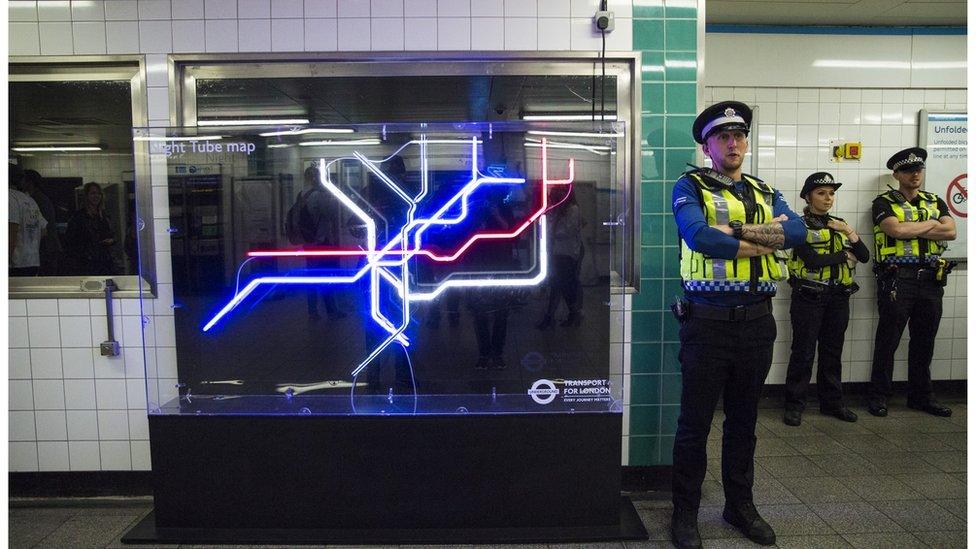London transport: Bystanders urged to report sexual harassment
- Published
Women's safety: ‘London is a breeding ground for harassment’
Bystanders who witness sexual harassment are being encouraged by the British Transport Police (BTP) to intervene safely where possible.
Its Speak Up, Interrupt campaign has been launched as incidents have almost doubled since pre-pandemic levels.
Det Supt Sarah White from BTP said "everyone has a part to play in driving out this unacceptable behaviour".
The Survivors Trust has welcomed the move, which it said put the focus back on the perpetrator's behaviour.
The charity said the All-Party Parliamentary Group on the United Nations (UN APPG) showed that 71% of women in the UK had experienced sexual assault in public, with this figure rising to 86% for those aged 18 to 24.
This report also showed that 55% of survey respondents did not report the crime as they did not think it was serious enough.
BTP has said its figures show reports of sexual harassment and sexual offences rose by 175% from 2019-20 compared to 2021-22.
"We're not asking people to police the railway, that's our job," Det Supt White said. "But small actions such as offering someone your seat if you notice them looking uncomfortable, alerting an officer, or reporting an incident to us can make an enormous difference.
"Your reports provide us with crucial information which helps us build a picture of what's happening on the network so we can identify crime hotspots, deploy patrols to catch offenders, and, crucially, bring them to justice."

Bookseller and embroidery artist Courtney has been harassed on multiple occasions in London. She describes the capital as "a breeding ground for harassment" because people "mind their own business".
She said: "There was a man sitting opposite me with a can of beer - it was quite a full carriage. He told me to open my legs so he could see up my skirt.
"Everyone was minding their own business, head down, pretending they didn't hear anything. I was hoping somebody would step in. I felt very young and vulnerable.
"I was so frazzled and so nervous, just crying on the Tube."

Only 3% of 18 to 24-year-olds reported not having experienced some form of sexual harassment in a public space, according to UN APPG, external.
Reports of sexual harassment on public transport jumped 63% last summer across Great Britain - BTP does not operate in Northern Ireland - compared to before the pandemic, figures show.
The Survivors Trust said: "By switching the focus back on to the perpetrator's behaviour, it helps to reinforce and remind others that these behaviours are not acceptable and that sexual harassment or assault of any kind in our society needs to be addressed.
"Additionally, it should not just be survivors who have to speak up and advocate."
Graham Daly, for TfL, said: "Everyone should feel safe and be safe when travelling around London at all times and the safety of women and girls is an absolute priority for us.
"We want anyone who experiences or witnesses this behaviour to report it to the police or a member of staff so that we can take action against offenders and put the right measures in place prevent this from happening.
"We know that people on public transport want to look out for and support one another if things don't feel right. If it is safe to do so, there are ways in which passengers can help if they witness someone being harassed or made to feel uncomfortable.
"They include getting help by calling the police or speaking to a member of transport staff, engaging with the passenger about something unrelated, helping the passenger to ignore the offender and their behaviour, or offering help and checking that they are OK."

Follow BBC London on Facebook, external, Twitter , externaland Instagram, external. Send your story ideas to hellobbclondon@bbc.co.uk, external
- Published13 March 2018
